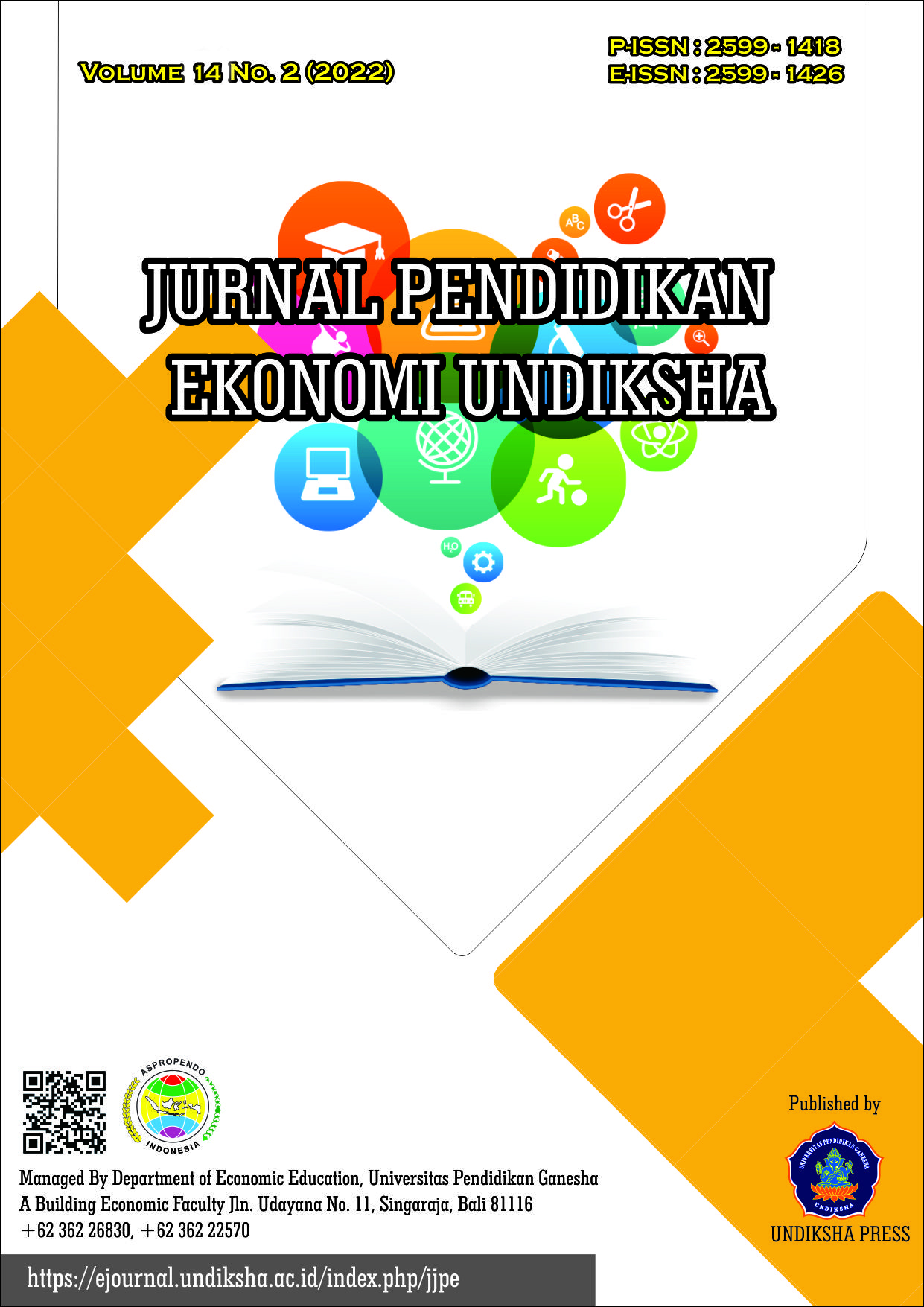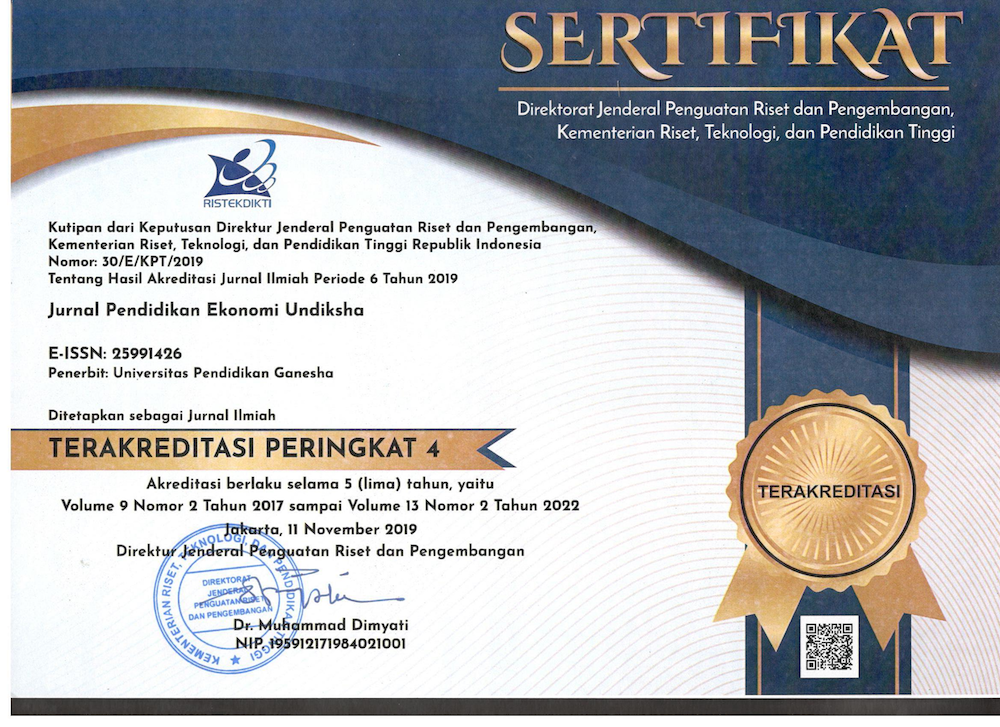Perceived Value pada Customer Loyalty Peran Mediasi Customer Engagement
(Studi Kasus Konsumen Trika Media Internet Access)
DOI:
https://doi.org/10.23887/jjpe.v14i2.52119Keywords:
Customer Loyalty, Customer Engagement, Perceived ValueAbstract
The Covid pandemic has changed the pattern of people's life habits, one of the impacts felt is that the operational needs of the office work industry, schools and so on have shifted during the pandemic. One of the impacts that arises is the need for an internet connection network that supports online operational activities. This need raises opportunities for business actors and competition and competition to win the hearts of new people and old consumers to continue using the internet network services offered by the company. Based on the results of previous studies, it is strengthened that by paying attention to and increasing the existence of perceived value and the existence of customer engagement will have a strong influence on customer loyalty. The purpose of this study is to determine the influence of perceived value on customer engagement and customer loyalty, the next purpose is to determine the influence of perceived value on customer loyalty through customer engagement, especially the picture related to consumer loyalty of internet network users of the global media network. The research uses a quantitative method approach, the method of determining the number of samples using the slovin approach with a total sample of 280 consumers. The data collection method is carried out by observation techniques, interviews and the distribution of research questionnaires. Data analysis was carried out using SEM-PLS data processing software with descriptive analysis stages, inferential analysis and evaluation of the goodness of fit PLS models. The results showed that perceived value has no influence on customer loyalty, perceived value has a positive effect on customer enagement and customer engagement has a positive and significant effect on customer loyalty. Customer enagement has a mediation role full of perceived value towards customer loyalty.
References
Amir, A., Mandey, S. L., & Tawas, H. N. (2021). Pengaruh perceived value, brand image terhadap customer loyalty melalui customer engagement sebagai variabel mediasi (studi pada pelangan indihome pt. Telkom manado). JMBI UNSRAT (Jurnal Ilmiah Manajemen Bisnis dan Inovasi Universitas Sam Ratulangi)., 7(3).
Bowden, J. (2009) ‘Customer engagement: A framework for assessing customer-brand relationships: The case of the restaurant industry’, Journal of Hospitality and Leisure Marketing, 18(6), pp. 574–596.
Fitriana, S. H., & Susanti, A. (2022). Pengaruh Perceived Service Quality, Perceived Value, Customer Satisfaction Terhadap Customer Loyalty Pengguna Jasa Grabfood di Solo Raya. Jurnal Ilmiah Edunomika, 6(2).
Ganthika, D., & Wahdiniwaty, R. (2020). The Effect 0f Cust0mer Value 0n Cust0mer L0yalty at Bandung T0urist L0cati0n. International Conference on Bussines, Economic, Sosial Science, and Humanites – Economics, Business and Management Track (ICOBEST-EBM 2019), 112, 110–112.
Ghozali. I. (2014) Structural Equation Modeling Metode Alternatif dengan Partial Least Squares (PLS). Semarang. Badan Penerbit Universitas Diponegoro.
Hair, Joseph F., et.al. (2010). Multivariate Data Analysis, 7th Edition. New York: Prentice Hall International, Inc
Kartanegara, H. W., & Keni, K. (2022, April). The Effect of Customer Engagement, Perceived Value and Customer Satisfaction Towards Customer Loyalty in the Indonesian Low-Cost Airlines Industry. In 3rd Tarumanagara International Conference on the Applications of Social Sciences and Humanities (TICASH 2021) (pp. 43-50). Atlantis Press.
Khasbulloh, A. H. K., & Suparna, G. (2022). Effect of Perceived Risk and Perceived Value on Customer Loyalty through Customer Satisfaction as Intervening Variables on Bukalapak Users. European Journal of Business and Management Research, 7(4), 22-28.
Kotler dan Keller. (2009). Manajemen Pemasaran. Jilid I. Edisi ke 13. Jakarta: Erlangga
Kotler, P. and Keller, K. L. (2016) Marketing Management Global Edition. 15e edn. New York: Edited by Pearson Education.
Lim, H., Widdows, R. and Park, J. (2006) ‘M-loyalty: Winning strategies for mobile carriers’, Journal of Consumer Marketing, 23(4), pp. 208–218
Lovelock, C. H. dan L. K. W. (2005) Manajemen Pemasaran Jasa. Jakarta: Penerbit Indeks
Meryawan, I. W., Kartika, I. M., Swandana, I. M. A., & Utama, I. G. B. R. (2022). The Important Role of Member Satisfaction in Building Loyalty of Fitness Members during Covid-19 Pandemic. International Journal of Current Science Research and Review Tahun, 5.
Patterson, P., Ting Yu and Ruyter, K. de (2006) ‘Understanding Customer Engagement in Services Paul Patterson’, Advancing theory, maintaining relevance, proceedings of ANZMAC 2006 conference, Brisbane. Brisbane, pp. 4–6.
Permadi, A., & Silalahi, S. (2021). The Effect of Customer Experience and Customer Engagement Through Customer Loyalty on Sales Revenue Achievement at PT United Tractors. Emerging Markets: Business and Management Studies Journal, 9(1), 1-17.
Schiffman, L. G. and Wisenblit, J. (2015) Consumer Behavior. Stephanie. Edited by D. Petrino. England: Pearson Education Limited.
Sugiyono. 2014. Metode Penelitian Kuantitatif Kualitatif dan R&D. Bandung: Alfabeta.
Yulistiana, Rosento, & lsnurrini Hidayat Susil0wati. (2018). Pengaruh Kebijakan Harga Terhadap Loyalitas Pelanggan Pada PT Dassa Prima Di Burning Copy & Digital Printing Depok. Cakrawala, 18(2), 244, 245.
Downloads
Published
How to Cite
Issue
Section
License
Copyright (c) 2022 Jurnal Pendidikan Ekonomi Undiksha

This work is licensed under a Creative Commons Attribution-ShareAlike 4.0 International License.





